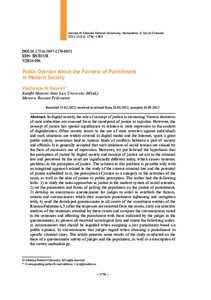Public Opinion About the Fairness of Punishment in Modern Society
Скачать файл:
URI (для ссылок/цитирований):
https://elib.sfu-kras.ru/handle/2311/149631Автор:
Voronin, Viacheslav N.
Воронин, В. Н.
Дата:
2022-12Журнал:
Журнал Сибирского федерального университета. Гуманитарные науки. Journal of Siberian Federal University. Humanities & Social Sciences; 2022 15 (12)Аннотация:
In digital society, the role of concept of justice is increasing. Various decisions of state authorities are assessed from the standpoint of justice or injustice. However, the concept of justice has special significance in relation to state repression in the context of digitalization. Often society reacts to the use of state coercion against individuals and such situations are widely covered in digital media and the Internet, spark a great public outcry, sometimes lead to various kinds of conflicts between a part of society and officials. It is generally accepted that such situations of social tension are caused by the facts of excessive use of repression. However, we put forward the hypothesis that the perception of justice by digital society and concept of justice set out in the criminal law and perceived by the court are significantly different today, which causes systemic problems in the perception of justice. The solution to this problem is possible only with an integrated approach related to the study of the current criminal law and the potential of justice embedded in it, the perception of justice as a category in the activities of the court, as well as the idea of justice in public perception. The author had the following tasks: 1) to study the main approaches to justice in the modern system of social sciences, 2) set the parameters and forms of polling the population on the justice of punishment, 3) develop an anonymous questionnaire for judges in order to establish the factors, criteria and circumstances which they associate punishment tightening and mitigation with, 4) send the developed questionnaire to all courts of the constituent entities of the Russian Federation, 5) after the responses are received from the courts, carry out selective analysis of the sentences awarded by these courts and compare the circumstances noted in the sentences and affecting the punishment with those indicated by the judges in the questionnaires; 6) process all received sociological data and create the following scales: a) circumstances that should be regarded when assigning a just punishment based on public opinion; b) circumstances that judges regard when choosing a punishment in specific criminal cases. The article presents some results of the study conducted on the basis of a questionnaire survey of judges and the population, as well as a description of the survey methodology В цифровом обществе возрастает роль понятия справедливости.
Различные решения органов государственной власти оцениваются с позиций
справедливости или несправедливости. Однако понятие справедливости имеет особое
значение в отношении государственных репрессий в условиях цифровизации. Часто
общество реагирует на применение государственного принуждения к личности,
и такие ситуации широко освещаются в цифровых СМИ и Интернете, вызывают
большой общественный резонанс, иногда приводят к разного рода конфликтам между
частью общества и чиновниками. Принято считать, что такие ситуации социальной
напряженности вызваны фактами чрезмерного применения репрессий. Однако мы
выдвигаем гипотезу о том, что восприятие справедливости цифровым обществом
и понятия справедливости, изложенные в уголовном праве и воспринимаемые судом,
сегодня существенно различаются, что вызывает системные проблемы в восприятии
справедливости. Решение данной проблемы возможно только при комплексном
подходе, связанном с изучением действующего уголовного законодательства
и заложенных в нем возможностей правосудия, восприятием справедливости
как категории в деятельности суда, а также представлением о справедливости
в общественном сознании. Перед автором стояли следующие задачи: 1) изучить
основные подходы к справедливости в современной системе общественных
наук, 2) установить параметры и формы опроса населения о справедливости
наказания, 3) разработать анонимную анкету для судей в целях установления
факторов, критериев и обстоятельств, с которыми они связывают ужесточение
и смягчение наказания, 4) разослать разработанную анкету во все суды субъектов
Российской Федерации, 5) после получения ответов судов провести выборочный
анализ приговоров, вынесенных этими судами, и сопоставить обстоятельства,
отмеченные в приговорах и влияющие на наказание, с указанными судьями
в анкетах; 6) обработать все полученные социологические данные и составить
следующие шкалы: а) обстоятельства, которые следует учитывать при назначении справедливого наказания на основе общественного мнения; б) обстоятельства,
которые судьи учитывают при избрании наказания по конкретным уголовным делам.
В статье представлены некоторые результаты исследования, проведенного на основе
анкетного опроса судей и населения, а также описание методики опроса

